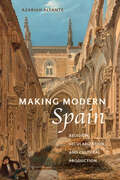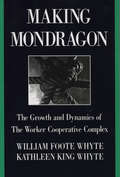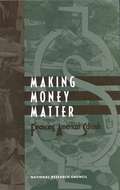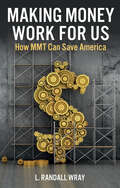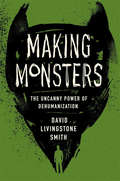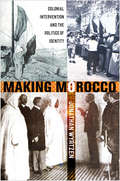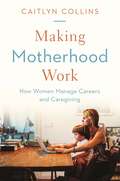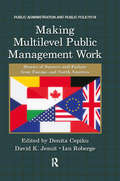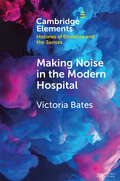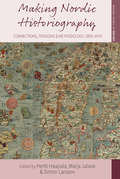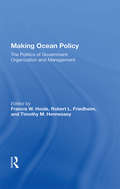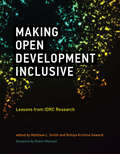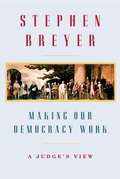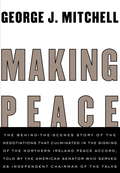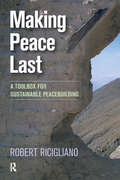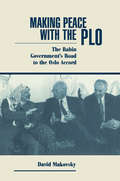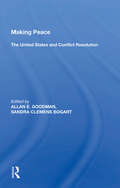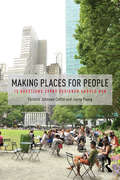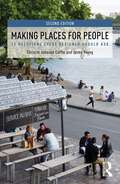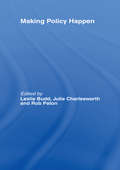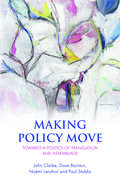- Table View
- List View
Making Modern Spain: Religion, Secularization, and Cultural Production (Campos Ibéricos: Bucknell Studies in Iberian Literatures and Cultures)
by Azariah AlfanteIn this elegantly written study, Alfante explores the work of select nineteenth-century writers, intellectuals, journalists, politicians, and clergy who responded to cultural and spiritual shifts caused by the movement toward secularization in Spain. Focusing on the social experience, this book probes the tensions between traditionalism and liberalism that influenced public opinion of the clergy, sacred buildings, and religious orders. The writings of Cecilia Böhl de Faber (Fernán Caballero), Gustavo Adolfo Bécquer, Benito Pérez Galdós, and José María de Pereda addressed conflicts between modernizing forces and the Catholic Church about the place of religion and its signifiers in Spanish society. Foregrounding expropriation (government confiscation of civil and ecclesiastical property) and exclaustration (the expulsion of religious communities), and drawing on archival research, the history of disentailment, cultural theory, memory studies, and sociology, Alfante demonstrates how Spain’s liberalizing movement profoundly influenced class mobility and faith among the populace.
Making Mondragón: The Growth and Dynamics of the Worker Cooperative Complex
by William Foote Whyte Kathleen King WhyteSince its founding in 1956 in Spain's Basque region, the Mondragón Corporation has been a touchstone for the international cooperative movement. Its nearly three hundred companies and organizations span areas from finance to education. In its industrial sector Mondragón has had a rich experience over many years in manufacturing products as varied as furniture, kitchen equipment, machine tools, and electronic components and in printing, shipbuilding, and metal smelting. Making Mondragón is a groundbreaking look at the history of worker ownership in the Spanish cooperative. First published in 1988, it remains the best source for those looking to glean a rich body of ideas for potential adaptation and implementation elsewhere from Mondragón's long and varied experience. This second edition, published in 1991, takes into account the major structural and strategic changes that were being implemented in 1990 to allow the enterprise to compete successfully in the European common market. Mondragón has created social inventions and developed social structures and social processes that have enabled it to overcome some of the major obstacles faced by other worker cooperatives in the past. William Foote Whyte and Kathleen King Whyte describe the creation and evolution of the Mondragón cooperatives, how they have changed through decades of experience, and how they have struggled to maintain a balance between their social commitments and economic realities. The lessons of Mondragón apply most clearly to worker cooperatives and other employee-owned firms, but also extend to regional development and stimulating and supporting entrepreneurship, whatever the form of ownership.
Making Money Matter: Financing America's Schools
by National Research CouncilThe United States annually spends over $300 billion on public elementary and secondary education. As the nation enters the 21st century, it faces a major challenge: how best to tie this financial investment to the goal of high levels of achievement for all students. In addition, policymakers want assurance that education dollars are being raised and used in the most efficient and effective possible ways. The book covers such topics as: Legal and legislative efforts to reduce spending and achievement gaps.The shift from "equity" to "adequacy" as a new standard for determining fairness in education spending.The debate and the evidence over the productivity of American schools.Strategies for using school finance in support of broader reforms aimed at raising student achievement. This book contains a comprehensive review of the theory and practice of financing public schools by federal, state, and local governments in the United States. It distills the best available knowledge about the fairness and productivity of expenditures on education and assesses options for changing the finance system.
Making Money Work for Us: How MMT Can Save America
by L. Randall WrayIs money precious and scarce, necessitating iron fiscal discipline? Must the government always balance the books or risk ruin? Or is money, in fact, a flexible tool that can be used to mobilize our collective resources to serve those who need them? In this book, leading Modern Money Theory (MMT) advocate Randy Wray explains that the only real constraints on public policy are physical resources, technological capacity and political will: but never money. He shows how modern sovereign governments spend by keystroking money to bank accounts. While taxes serve other important purposes, they do not – contrary to popular belief – fund spending. If we recognize this, and totally reframe how we think about money and debt, we can marshal our national wealth to make us all richer, eliminate unemployment and &“look after our own.&” We can make money work for us – the US. This book's account shows how MMT can become a new American political and economic orthodoxy, replacing the dominant conservative framework forever. It is essential reading for all progressives.
Making Monsters: The Uncanny Power of Dehumanization
by David Livingstone SmithA leading scholar explores what it means to dehumanize others—and how and why we do it. “I wouldn’t have accepted that they were human beings. You would see an infant who’s just learning to smile, and it smiles at you, but you still kill it.” So a Hutu man explained to an incredulous researcher, when asked to recall how he felt slaughtering Tutsis in Rwanda in 1994. Such statements are shocking, yet we recognize them; we hear their echoes in accounts of genocides, massacres, and pogroms throughout history. How do some people come to believe that their enemies are monsters, and therefore easy to kill? In Making Monsters David Livingstone Smith offers a poignant meditation on the philosophical and psychological roots of dehumanization. Drawing on harrowing accounts of lynchings, Smith establishes what dehumanization is and what it isn’t. When we dehumanize our enemy, we hold two incongruous beliefs at the same time: we believe our enemy is at once subhuman and fully human. To call someone a monster, then, is not merely a resort to metaphor—dehumanization really does happen in our minds. Turning to an abundance of historical examples, Smith explores the relationship between dehumanization and racism, the psychology of hierarchy, what it means to regard others as human beings, and why dehumanizing others transforms them into something so terrifying that they must be destroyed. Meticulous but highly readable, Making Monsters suggests that the process of dehumanization is deeply seated in our psychology. It is precisely because we are all human that we are vulnerable to the manipulations of those trading in the politics of demonization and violence.
Making Morocco: Colonial Intervention and the Politics of Identity
by Jonathan WyrtzenHow did four and a half decades of European colonial intervention transform Moroccan identity? As elsewhere in North Africa and in the wider developing world, the colonial period in Morocco (1912–1956) established a new type of political field in which notions about and relationships among politics and identity formation were fundamentally transformed. Instead of privileging top-down processes of colonial state formation or bottom-up processes of local resistance, the analysis in Making Morocco focuses on interactions between state and society. Jonathan Wyrtzen demonstrates how, during the Protectorate period, interactions among a wide range of European and local actors indelibly politicized four key dimensions of Moroccan identity: religion, ethnicity, territory, and the role of the Alawid monarchy. This colonial inheritance is reflected today in ongoing debates over the public role of Islam, religious tolerance, and the memory of Morocco's Jews; recent reforms regarding women’s legal status; the monarchy’s multiculturalist recognition of Tamazight (Berber) as a national language alongside Arabic; the still-unresolved territorial dispute over the Western Sahara; and the monarchy’s continued symbolic and practical dominance of the Moroccan political field.
Making Motherhood Work: How Women Manage Careers and Caregiving
by Caitlyn CollinsA moving, cross-national account of working mothers’ daily lives—and the revolution in public policy and culture needed to improve themThe work-family conflict that mothers experience today is a national crisis. Women struggle to balance breadwinning with the bulk of parenting, and stress is constant. Social policies don’t help. Of all Western industrialized countries, the United States ranks dead last for supportive work-family policies: No federal paid parental leave. The highest gender wage gap. No minimum standard for vacation and sick days. The highest maternal and child poverty rates. Can American women look to European policies for solutions? Making Motherhood Work draws on interviews that sociologist Caitlyn Collins conducted over five years with 135 middle-class working mothers in Sweden, Germany, Italy, and the United States. She explores how women navigate work and family given the different policy supports available in each country.Taking readers into women’s homes, neighborhoods, and workplaces, Collins shows that mothers’ desires and expectations depend heavily on context. In Sweden—renowned for its gender-equal policies—mothers assume they will receive support from their partners, employers, and the government. In the former East Germany, with its history of mandated employment, mothers don’t feel conflicted about working, but some curtail their work hours and ambitions. Mothers in western Germany and Italy, where maternalist values are strong, are stigmatized for pursuing careers. Meanwhile, American working mothers stand apart for their guilt and worry. Policies alone, Collins discovers, cannot solve women’s struggles. Easing them will require a deeper understanding of cultural beliefs about gender equality, employment, and motherhood. With women held to unrealistic standards in all four countries, the best solutions demand that we redefine motherhood, work, and family.Making Motherhood Work vividly demonstrates that women need not accept their work-family conflict as inevitable.
Making Multilevel Public Management Work: Stories of Success and Failure from Europe and North America (Public Administration and Public Policy)
by David K. Jesuit Denita Cepiku Ian RobergeThis collected volume provides insights into the theory and practice of intergovernmenal relationships, bringing together 8 case studies from Canada, US, and Italy. The book indentifies and analyzes the experiences of effective coordination among different levels of government, neighbor countries, and different policy sectors. By highlighting the successes and failures of a series of topic-driven focused studies, the book extrapolates best practices for success.
Making News in Global India
by Sahana UdupaIn the decades following India's opening to foreign capital, the city of Bangalore emerged, quite unexpectedly, as the outsourcing hub for the global technology industry and the aspirational global city of liberalizing India. Through an ethnography of English and Kannada print news media in Bangalore, this ambitious and innovative new study reveals how the expanding private news culture played a critical role in shaping urban transformation in India, when the allegedly public profession of journalism became both an object and agent of global urbanization. Building on extensive fieldwork carried out with the Times of India group, the largest media house in India, between 2008 and 2012, Sahana Udupa argues that the class project of the 'global city' news discourse came into striking conflict with the cultural logics of regional language and caste practices. Advancing new theoretical concepts, Making News in Global India takes arguments in media scholarship beyond the dichotomy of public good and private accumulation.
Making Noise in the Modern Hospital (Elements in Histories of Emotions and the Senses)
by Victoria BatesThis Element examines the problem of hospital noise, a problem that has repeatedly been discovered anew, with each new era bringing its own efforts to control and abate unwanted sound in healthcare settings. Why, then, has hospital noise never been resolved? This question is at the heart of Making Noise in the Modern Hospital, which brings together histories of the senses, space, technology, society, medicine and architecture to understand the changing cacophony of the late twentieth-century hospital. This Element is fundamentally interdisciplinary – despite being historical, it comes up to the present day and brings in scholarship on space, place, atmosphere and the senses that will have relevance to scholars working outside of historical research. The intersection between medical and sensory histories also puts interdisciplinary research at the Element's core.
Making Nordic Historiography: Connections, Tensions and Methodology, 1850-1970
by Marja Jalava Pertti Haapala Simon LarssonIs there a "Nordic history"? If so, what are its origins, its scope, and its defining features? In this informative volume, scholars from all five Nordic nations tackle a notoriously problematic historical concept. Whether recounting Foucault's departure from Sweden or tracing the rise of movements such as "aristocratic empiricism," each contribution takes a deliberately transnational approach that is grounded in careful research, yielding rich, nuanced perspectives on shifting and contested historical terrain.
Making North America
by James A. ThompsonMuch has been written about the trilateral relationship between Canada, the United States, and Mexico, and the free trade agreements that this relationship has spawned. In Making North America, James Thompson uses the Canada-US Free Trade Agreement of 1988 and the North American Free Trade Agreement of 1994 to demonstrate that there has been an often-unrecognized impulse behind the process of North American integration - national security.Featuring interviews with key decision-makers from all three countries, including Brian Mulroney, George H.W. Bush, and Carlos Salinas, Making North America is a rigorous analysis of the role national security has played in North American integration. Furthermore, Thompson's evidence suggests that the processes at work in North America are part of a global phenomenon where regions are progressively coalescing into larger-scale political entities.
Making Ocean Policy: The Politics Of Government Organization And Management
by Robert L. Friedheim Francis W. Hoole Timothy M. HennesseyWritten in response to the increasing interest in the making of ocean policy, this collection of original articles surveys the history of U.S. ocean policy, ocean policy advocacy, and the struggle within government to determine how best to develop and implement a sensible ocean policy. The increasing complexity of the issues, programs, and policies related to marine and coastal zone matters and the increasing number of government agencies and interest groups formed to deal with these matters reflect the growing awareness of their importance. But, reflect the editors, in an enormously complex world, where many interests are in conflict and where information is tentative and incomplete—yet often overwhelmingly abundant—there are few easy solutions to ocean policy problems.
Making Open Development Inclusive: Lessons from IDRC Research (International Development Research Centre)
by Matthew L. Smith and Ruhiya Kristine SewardDrawing on ten years of empirical work and research, analyses of how open development has played out in practice.A decade ago, a significant trend toward openness emerged in international development. "Open development" can describe initiatives as disparate as open government, open health data, open science, open education, and open innovation. The theory was that open systems related to data, science, and innovation would enable more inclusive processes of human development. This volume, drawing on ten years of empirical work and research, analyzes how open development has played out in practice.
Making Our Democracy Work: A Judge's View
by Stephen BreyerThe Supreme Court is one of the most extraordinary institutions in our system of government. Charged with the responsibility of interpreting the Constitution, the nine unelected justices of the Court have the awesome power to strike down laws enacted by our elected representatives. Why does the public accept the Court's decisions as legitimate and follow them, even when those decisions are highly unpopular? What must the Court do to maintain the public's faith? How can the Court help make our democracy work? These are the questions that Justice Stephen Breyer tackles in this groundbreaking book. Today we assume that when the Court rules, the public will obey. But Breyer declares that we cannot take the public's confidence in the Court for granted. He reminds us that at various moments in our history, the Court's decisions were disobeyed or ignored. And through investigations of past cases, concerning the Cherokee Indians, slavery, and Brown v. Board of Education, he brilliantly captures the steps--and the missteps--the Court took on the road to establishing its legitimacy as the guardian of the Constitution. Justice Breyer discusses what the Court must do going forward to maintain that public confidence and argues for interpreting the Constitution in a way that works in practice. He forcefully rejects competing approaches that look exclusively to the Constitution's text or to the eighteenth-century views of the framers. Instead, he advocates a pragmatic approach that applies unchanging constitutional values to ever-changing circumstances--an approach that will best demonstrate to the public that the Constitution continues to serve us well. The Court, he believes, must also respect the roles that other actors--such as the president, Congress, administrative agencies, and the states--play in our democracy, and he emphasizes the Court's obligation to build cooperative relationships with them. Finally, Justice Breyer examines the Court's recent decisions concerning the detainees held at Guantánamo Bay, contrasting these decisions with rulings concerning the internment of Japanese-Americans during World War II. He uses these cases to show how the Court can promote workable government by respecting the roles of other constitutional actors without compromising constitutional principles. Making Our Democracy Work is a tour de force of history and philosophy, offering an original approach to interpreting the Constitution that judges, lawyers, and scholars will look to for many years to come. And it further establishes Justice Breyer as one of the Court's greatest intellectuals and a leading legal voice of our time.
Making Peace
by George MitchellFifteen minutes before five o'clock on Good Friday, 1998, Senator George Mitchell was informed that his long and difficult quest for an Irish peace accord had succeeded--the Protestants and Catholics of Northern Ireland, and the governments of the Republic of Ireland and the United Kingdom, would sign the agreement. Now Mitchell, who served as independent chairman of the peace talks for the length of the process, tells us the inside story of the grueling road to this momentous accord.For more than two years, Mitchell, who was Senate majority leader under Presidents Bush and Clinton, labored to bring together parties whose mutual hostility--after decades of violence and mistrust--seemed insurmountable: Sinn Fein, represented by Gerry Adams; the Catholic moderates, led by John Hume; the majority Protestant party, headed by David Trimble; Ian Paisley's hard-line unionists; and, not least, the governments of the Republic of Ireland and the United Kingdom, headed by Bertie Ahern and Tony Blair.The world watched as the tense and dramatic process unfolded, sometimes teetering on the brink of failure. Here, for the first time, we are given a behind-the-scenes view of the principal players--the personalities who shaped the process--and of the contentious, at times vitriolic, proceedings. We learn how, as the deadline approached, extremist violence and factional intransigence almost drove the talks to collapse. And we witness the intensity of the final negotiating session, the interventions of Ahern and Blair, the late-night phone calls from President Clinton, a last-ditch attempt at disruption by Paisley, and ultimately an agreement that, despite subsequent inflammatory acts aimed at destroying it, has set Northern Ireland's future on track toward a more lasting peace.
Making Peace
by Guillaume DevinDo international institutions really contribute to building a lasting peace? It's doubtful, as counter-examples and criticisms abound: malfunctioning, failures, and submissiveness to the interests of the most powerful states. As diplomats, practitioners with these institutions, and experts on their processes, the authors know this territory well. With what they deem a realist and constructive perspective, they underline the strengths and weaknesses that these international actors have created and won't abandon. Their research and investigations lead to the conclusion that despite the fact that it is possible to wage a war against the will of international institutions, it has become almost impossible to make peace without them. The choice of issues - collective security, disarmament, mediation, peace building, human security, reduction of poverty and inequalities, international criminal justice, multilateralism - make this edited volume a reference work on international organizations. "
Making Peace Last: A Toolbox for Sustainable Peacebuilding
by Robert RiciglianoThe international community invests billions annually in thousands of projects designed to overcome poverty, stop violence, spread human rights, fight terrorism and combat global warming. The hope is that these separate projects will 'add up' to lasting societal change in places like Afghanistan. In reality, these initiatives are not adding up to sustainable peace. Making Peace Last offers ways of improving the productivity of peacebuilding. This book defines the theory, analysis and practice needed to create peacebuilding approaches that are as dynamic and adaptive as the societies they are trying to affect. The book is based on a combination of field experience and research into peacebuilding and conflict resolution. This book can also be used as a textbook in courses on peace-building, security and development. Making Peace Last is a comprehensive approach to finding sustainable solutions to the world's most pressing social problems.
Making Peace With The Plo: The Rabin Government's Road To The Oslo Accord
by David MakovskyAfter decades of being seen by Israel as a terrorist and arch-enemy, Yasser Arafat became a partner in the peace-making progress. In one of the most extraordinary examples of secret diplomacy this century, Israel's Prime Minister, Foreign Minister and other senior aides privately negotiated an end to years of hostility between Arabs and Israelis. Exploring the personal, domestic, regional and international factors leading to the peace accords, this book charts key episodes such as Israel's deportation of radical Islamic activists in December 1992, and its retaliation against Hizbollah rocket attacks from south Lebanon in July 1993. Interview with Israeli, Palestinian, American and Egyptian officials are used to build up a detailed picture of the Israeli-PLO bargaining process, culminating in the historic breakthrough in Oslo.
Making Peace: The United States And Conflict Resolution (Case Studies In International Affairs)
by Allan E. Goodman Sandra Clemens BogartAs recent conflicts in Panama and the Persian Gulf demonstrate, we know much more about making war than we do about making peace. Such conflicts are not likely to disappear, and this volume reviews what has and hasn't worked in negotiating an end to war. Six case studies-ranging from World War I to the Persian Gulf crisis-illustrate a variety of actors, stakes, and strategies involved in the peacemaking process. Key turning points toward peace or deadlock are identified along the way. Making Peace also provides discussion questions, historical backgrounds, and theoretical introductions to show different-and differentially successful-avenues to peace.
Making People-Friendly Towns: Improving the Public Environment in Towns and Cities
by Francis TibbaldsMaking People-Friendly Towns explores the way our towns and cities, particularly their central areas, look and feel to all their users and discusses their design, maintenance and management. Francis Tibbalds provides a new philosophical approach to the problem, suggesting that places as a whole matter much more than the individual components that make up the urban environment such as buildings, roads and parks. This informative book suggests the way forward for professionals, decision-makers and all those who care about the future of our urban environment and points the reader in the direction of a wealth of living examples of successful town planning.
Making Places for People: 12 Questions Every Designer Should Ask
by Jenny Young Christie Johnson Coffin** Honorable Mention at the 2019 ERDA Great Places Awards ** Making Places for People explores twelve social questions in environmental design. Authors Christie Johnson Coffin and Jenny Young bring perspectives from practice and teaching to challenge assumptions about how places meet human needs. The book reveals deeper complexities in addressing basic questions, such as: What is the story of this place? What logic orders it? How big is it? How sustainable is it? Providing an overview of a growing body of knowledge about people and places, Making Places for People stimulates curiosity and further discussion. The authors argue that critical understanding of the relationships between people and their built environments can inspire designs that better contribute to health, human performance, and social equity—bringing meaning and delight to people’s lives.
Making Places for People: 12 Questions Every Designer Should Ask
by Jenny Young Christie Johnson CoffinMaking Places for People explores 12 social questions crucial to environmental design. Authors Christie Johnson Coffin and Jenny Young bring perspectives from practice and teaching to challenge assumptions about how places meet human needs. In this expanded second edition, the authors continue to explore the complexities of basic questions, such as: What is the story of this place? What logic orders it? How big is it? How sustainable is it? They consider the impact on making places of pandemic, climate change, human migration, and contemporary discussions of diversity, equity, and justice. Short, approachable, easy-to-read chapters, illustrated with updated examples of projects from around the world, bring together theory, methodology and key research findings. Understanding experienced and research-based connections between people and built form can inspire designs that make places of meaning and delight. This second edition will be essential reading for design students and professionals.
Making Policy Happen
by Leslie Budd‘Policy work’ is increasingly conducted by public managers at different levels of seniority, and in a variety of settings. This significant collection of readings focuses on the discussion of how policy work happens, whether that involves bringing a policy-making process to fruition or the implementation of policy. The ideas included here draw on many different academic disciplines including economics, political science, social policy, international relations, organizational behaviour and psychology. The book is divided into four key sections, each with an introduction by the editors, covering: understanding policy processesgovernance contextsinstruments and discoursesleadership in policy work. This key text equips the reader with the fundamental knowledge and the essential ability required to critically analyze the key theoretical, conceptual and operational approaches to the development and management of public policy. Containing timeless papers that are the building blocks of understanding public policy, this important volume allows the reader to analyze new issues in appropriate contexts and one’s own setting.
Making Policy Move: Towards a Politics of Translation and Assemblage
by John Clarke Dave BaintonResponding to increasing interest in the movement of policies between places, sites and settings, this timely book presents a critical alternative to approaches centred on ideas of policy transfer, dissemination or learning. Written by key people in the field, it argues that treating policy’s movement as an active process of ‘translation’, in which policies are interpreted, inflected and re-worked as they change location, is of critical importance for studying policy. The book provides an exciting and accessible analytical and methodological foundation for examining policy in this way and will be a valuable resource for those studying policy processes at both undergraduate and post-graduate levels. Mixing collectively written chapters with individual case studies of policies and practices, the book provides a powerful and productive introduction to rethinking policy studies through translation. It ends with a commitment to the possibilities of thinking and doing ‘policy otherwise’.
